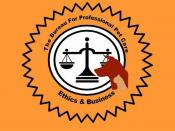BUSINESS ETHICS REFLECTION 1
Business Ethics Reflection
Kimberly Adcock
XMGT/216
August 10, 2014
Shakema Fleming-Sanders
BUSINESS ETHICS REFLECTION 2
DESCRIBE THE RELATIONSHIP AMONG VIRTUE, VALUES, AND MORAL CONCEPTS IN THE ETHICAL DILEMMA
Companies often promote a particular set of values through a corporate mission statement, code of ethics. The extent to which individual employees apply these values on a day-to-day basis depends on an employee's own moral philosophy. An employee will not always act in accordance with the company's philosophy. The word value refers to the perceived worth of a thing. An expensive house has a financial value because people are willing to pay money to own it. But, honesty has moral value because many people see those who are honest as having more worth than those who are not, and because some people are willing to make personal sacrifices to achieve honesty. A company's mission statements, often reference moral virtues based on values of the owner of the company wants to promote.
For an example, a realtor might use the statement, "Integrity, Loyalty Trust". Integrity, Loyalty, and Trust are all virtues, so the purpose of the statement is for all employees of the realtor to be guided by those three virtues when making their decisions. Ethical systems based on abstract virtues are referred to as "virtue ethics" systems. There are other systems for making ethical decisions, and some of them produce very different results, depending on the situation. Everyone has a mortal philosophy of some kind; even if they do not know what an ethicist would call it. When an employee's moral philosophy differs from that of the company, he might give lip service to the company mission statement but will be more likely to act according to his values. For example, an employee might believe that ethical...


